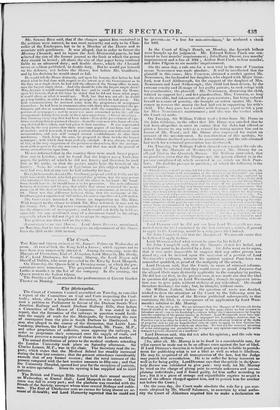frbc SiirtropaItd.
The Court of Common COLIfleil assembled on Tuesday, to consider a report of the Committee on Coal and Corn respecting the Coal. trade; when, after a lengthened discussion, it was agreed to pre- sent a petition to Parliament in favour of the Durham South-West Junction Railway and South Durham Railway Bills, then before a Committee of the House of Commons. It was stated in the report, that the formation of the railways in question would facili- tate the supply of coals for the Metropolis, by lessening the cost of conveyance from the pits in South Durham to Hartlepool. It ,tvas also alleged in the course of the discussion, that Lords Lon- ssonderry, Durham, the Duke of Northumberland, Mr. Pease, M. P., and other proprietors of colleries, were opposing the railways, in order to perpetuate their command over the supply of coals, and therefore preserve a tnonoply price of them in the London market. The annual distribution of prizes to the medical students attending the London University took place on Saturday afternoon. Sir Charles Lemon, M.P., was in the chair. The Secretary read the re- port ; which states that the Medical School has steadily increased during the four last sessions; that the present attendance considerably exceeds that of any former session; that the total increase of the present compared with the last session amounts to fifty-one ; and that the University Hospital, opened last year for the reception of patients, is in active operation. Since its opening it has supplied aid to 5353 patients.
The British and Foreign Bible Society held their annual meeting on Wednesday, at Exeter Hall; Lord Morpeth in the chair. The room was full in every part ; and the platform was crowded with the friends of the Society, amongst whom were several Bishops and noble- men. The Earl of Chichester sent an excuse for being absent on ac- count of ill-health; and Lord Harrowby regretted that he could not
be present—us " a fine for non-attendance," he enclosed cheeft for I001.


























 Previous page
Previous page